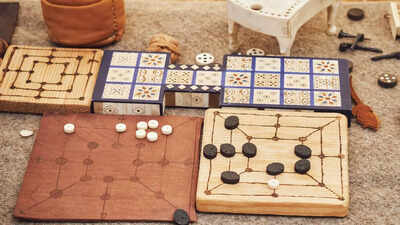ARTICLE AD BOX

We often think of games today as something you download – fast, flashy, designed for screens. But games didn’t start there. Long before controllers and consoles, people were playing with what they had – tiles, stones, boards, even the ground.Some of these games were played in temples. Some on palace floors. Some are just at home with family. What’s surprising is that many of them haven’t gone away. They’ve changed a little – a rule here, a modern board there – but the way they bring people together? Still the same.And they’re not just old stories. These games are still played. Quietly, often. But still very much alive – in schools, homes, even international tournaments.Here are six games that began centuries ago. Some even thousands of years back. Yet somehow, they’ve stayed with us.Chess

Before it became the game of kings and global championships, chess began as Chaturanga in ancient India around the 6th century. From there, it spread across Persia, the Arab world, and eventually into Europe. Though the rules have evolved, its reputation as one of the most intellectually challenging games has stayed the same.
Whether it’s in a park or a world final, chess remains unmatched in strategic depth.Snakes and Ladders

This game has had a surprising journey. Originally called Moksha Patam in ancient India, it wasn’t designed for fun – it was a moral lesson. The ladders represented virtues; the snakes, vices. British colonists turned it into the more playful version kids know today. TablutOnce played in Viking-age Scandinavia, Tablut is a version of the ancient strategy game Hnefatafl.
It was different from most board games because the two sides weren’t equal – one defended a king, the other tried to capture him. It faded over the centuries, but modern board game fans have brought it back, intrigued by its asymmetric style and Norse heritage.Nine Men’s Morris

This two-player game has popped up across history – from ancient Egypt to medieval Europe. Known in some regions as “Mill,” it’s simple on the surface: form rows of three and remove your opponent’s pieces.
But it rewards strategic thinking and forward planning. Even today, it’s still played in classrooms and historical reenactments.Senet

Believed to be one of the oldest board games ever discovered, Senet was more than just entertainment. In ancient Egypt, it symbolised the journey of the soul after death. The game dates back over 5,000 years, and though nobody knows its exact original rules, modern versions have been recreated for museums, classrooms, and curious gamers.GoGo may be the quietest of all competitive games, but don’t be fooled – it’s brutally complex. Developed over 2,500 years ago in China, Go is about surrounding territory with simple black and white stones. It spread to Korea and Japan, and today, serious players compete in high-level tournaments. Even artificial intelligence has struggled to master it fully – which says a lot.



.png)
.png)
.png)
















 3 hours ago
4
3 hours ago
4









 English (US) ·
English (US) ·